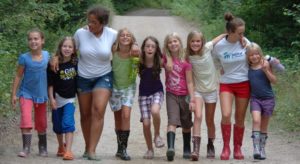Girls with Grit: Camp Director Shares Tips for Building Resilient Leaders
When camp personnel gathered in New Hampshire earlier this month for the annual American Camp Association-New England conference they were offered dozens of workshops for improving camp operations. Among the presenters was Sarah Gordon Littlefield, director of Vermont’s Aloha Camp, a residential camp for girls aged 12-17. Littlefield delivered a wide-ranging talk, offering her audience background on the current gender gap in the U.S., concepts underlying female adolescent development, characteristics of safe communities that help develop leadership skills, and ideas for creating those safe spaces. And her message was clear: girls can be resilient, confident leaders. And camps can help make that happen.

Littlefield began her presentation with statistics exemplifying the current gender gap in the U.S. For example, in 2014, women earned 83 percent of the salary of their male counterparts. Women comprise only 4.2 percent Fortune 500 company CEOs, hold only 18 percent of the seats in Congress, and comprise only 29 percent of the STEM workforce.
Girls Tend To Blame Themselves More Than Boys
Girls’ adolescent development must also be considered in conversations about supporting girls’ growth, Littlefield said. For example, girls feel pressure to be perfect “in a world with multiple and ever-changing definition of perfection,” she said. Girls’ expectations of future success are affected by past or present failures, rather than successes, and girls tend to blame themselves more than boys do. Littlefield also said girls often attribute failure to intrinsic factors and successes to extrinsic factors, and they tend to feel more shame than boys. In addition, she said girls often interpret and respond to failure in self-destructive ways. Body image preoccupation is common in girls’ tween and teens, Littlefield added, and widespread use of social media gives rise to even more profound self-judgment by girls.
Littlefield described several terms and definitions that are important to consider in connection with helping girls move forward. Safety, she said, is freedom from harm or danger, though not from risk, pain, injury, or loss. She described failure as a lack of success, and said it can give rise to experience, knowledge, and growth. Resilience is the ability to cope successfully with severe stress and negative events – the ability to bounce back. Littlefield also defined “grit” as courage and resolve, strength of character, and perseverance and motivation over the long haul.

It is important to consider aspects of a “growth mindset” when working with girls, Littlefield suggested. Individuals with such a mindset have the belief that they can learn more or become smarter through hard work and perseverance. They believe that curiosity and inquisitiveness are difference-makers.
Camp Staff Can Help Girls Be More Intentional With Each Other
Camp is an ideal environment for fostering growth in girls, Littlefield said. First, camp staff can help girls “be more intentional with each other, do less comparing of one another,” she said. Adults can be positive role models in the use of language, Littlefield said, as well as for strong relationships.

Camp is also a place where girls can observe failure, and where they can see people rally around those who learn from failure, Littlefield said. Encouraging risk taking is also essential, she said.
Camp Gives Girls The Chance To Practice Expressing Their Desires
Girls can work on establishing their individual voices at camp, too. Littlefield suggests giving girls the chance to practice expressing their desires, even around small things. “Remember, the stakes can be low at camp, so it’s a good place to practice taking risks and speaking their voices,” Littlefield said.

But girls can take the lessons they learn at camp back home with them, Littlefield said. Blurring the lines between camp and home helps dispel the notion that girls are their “best selves” while at camp. Being intentional in conversations about “how to take your camp self home” is key, she said.
Maine boasts camps for kids of all ages, kids with all varieties of interests. Many of those camps are residential girls’ camps, whose missions include a commitment to help mold confident, compassionate, resilient girls – girls who know their own voices and aspirations. At the ACA-NE conference, Sarah Gordon Littlefield shared ideas and insights that camp staff from around New England can implement. As a result, girls of all ages – here in Maine, and beyond – will get even more support in gaining growth and grit.